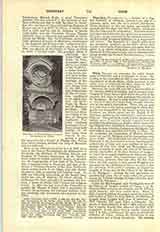

Dignitary, ECCLESIASTICAL, a member of a chapter, cathedral or collegiate, possessed not only of a foremost place, but also of a certain jurisdiction. These dignitates, as they are called, are usually the provost and the dean (see those articles), sometimes also the custos and the scholasticus. Their nomination and canonical institution, to a great extent reserved to the pope, are governed partly by common ecclesiastical law, partly by special legislation (e.g. concordats) and custom. The dignitates of a chapter differ from the personatus, inasmuch as the latter officers have merely a fixed right of precedence, and again from the officia (e.g. canon theologian, canon penitentiary), inasmuch as these places imply only an administrative charge or duty (see Ecclesiastical Person; Canon (person); Chapter).
THOMAS J. SHAHAN

